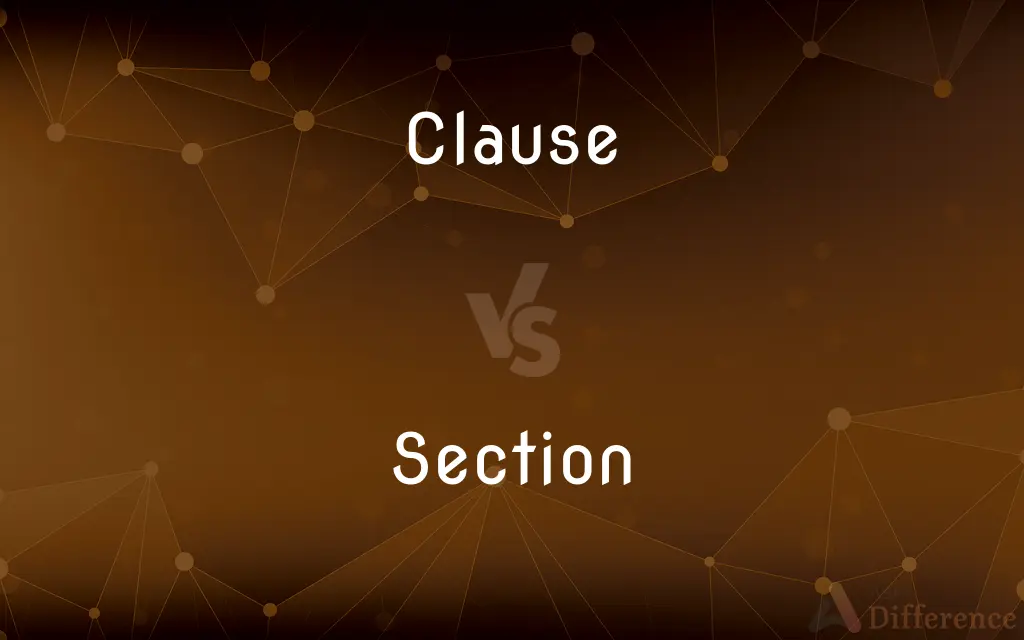Clause vs. Section — What's the Difference?
By Urooj Arif & Fiza Rafique — Updated on April 30, 2024
A clause is a group of words containing a subject and predicate, often part of a larger sentence structure, while a section is a distinct part of a document or publication, usually labeled for clarity.

Difference Between Clause and Section
Table of Contents
ADVERTISEMENT
Key Differences
A clause functions as a grammatical unit within a sentence, containing at least a subject and a verb, which conveys a complete or incomplete thought. Whereas, a section refers to a formally defined division within a document or text, often numbered or titled to organize content.
Clauses can be independent, expressing a complete thought and able to stand alone as a sentence, or dependent, not expressing a complete thought and requiring additional information to make sense. On the other hand, sections are used to separate and categorize information within a document, regardless of the grammatical structure of the text contained within.
In writing, clauses are essential for constructing complex sentences and conveying nuanced ideas. In contrast, sections help in structuring documents such as books, reports, or articles, facilitating navigation and comprehension.
Specific types of clauses include main clauses, subordinate clauses, and relative clauses, each serving different roles in sentence construction. Conversely, sections might be divided into sub-sections, chapters, paragraphs, or parts, depending on the length and style of the document.
Understanding the use of clauses is crucial for mastering language and effective communication, emphasizing grammar and syntax. Conversely, understanding the use of sections is crucial for mastering document layout and organization, emphasizing logical structure and reader accessibility.
ADVERTISEMENT
Comparison Chart
Definition
A group of words with a subject and verb
A distinct part of a document or text
Purpose
Conveys a thought within a sentence
Organizes content within a document
Types
Independent, dependent, relative
Chapters, subsections, parts
Usage in Writing
Sentence construction
Document organization
Reader's Interaction
Understand through grammar and syntax
Navigate through labels or titles
Compare with Definitions
Clause
A clause that modifies a noun or pronoun.
The athlete who trains hard wins.
Section
A numbered part of a legal document.
Refer to section 2.3 for details.
Clause
A clause that acts as a noun.
Whatever you decide works for me.
Section
A part of a newspaper categorized by subject.
Read the sports section for the latest news.
Clause
A clause that does not express a complete thought and cannot stand alone.
Because she runs daily,
Section
A major subdivision of a book.
See the third section for more on this topic.
Clause
A clause that expresses a complete thought.
She runs daily.
Section
A segment of a research paper like methodology.
The methodology section explains the experiment.
Clause
A clause that functions as an adverb.
She smiles when she is happy.
Section
A clearly divided part of a report.
The results are in the following section.
Clause
In language, a clause is a constituent that links a semantic predicand (expressed or not) and a semantic predicate. A typical clause consists of a subject and a syntactic predicate, the latter typically a verb phrase, a verb with any objects and other modifiers.
Section
One of several components; a piece.
Clause
(Grammar) A group of words containing a subject and a predicate and forming part of a compound or complex sentence.
Section
A subdivision of a written work.
Clause
A distinct article, stipulation, or provision in a document.
Section
(Law) A distinct portion or provision of a legal code or set of laws, often establishing a particular legal requirement
Section 5 of the Voting Rights Act.
Clause
(grammar) A verb, its necessary grammatical arguments, and any adjuncts affecting them.
Section
A distinct portion of a newspaper
The sports section.
Clause
(grammar) A verb along with its subject and their modifiers. If a clause provides a complete thought on its own, then it is an independent (superordinate) clause; otherwise, it is (subordinate) dependent.
Section
A distinct area of a town, county, or country
A residential section.
Clause
(legal) A separate part of a contract, a will or another legal document.
Section
A land unit equal to one square mile (2.59 square kilometers), 640 acres, or 1/36 of a township.
Clause
To amend (a bill of lading or similar document).
Section
The act or process of separating or cutting, especially the surgical cutting or dividing of tissue.
Clause
A separate portion of a written paper, paragraph, or sentence; an article, stipulation, or proviso, in a legal document.
The usual attestation clause to a will.
Section
A thin slice, as of tissue, suitable for microscopic examination.
Clause
A subordinate portion or a subdivision of a sentence containing a subject and its predicate.
Section
A segment of a fruit, especially a citrus fruit.
Clause
See Letters clause or Letters close, under Letter.
Section
Representation of a solid object as it would appear if cut by an intersecting plane, so that the internal structure is displayed.
Clause
(grammar) an expression including a subject and predicate but not constituting a complete sentence
Section
(Music) A group of instruments or voices in the same class considered as a division of a band, orchestra, or choir
The rhythm section.
The woodwind section.
Clause
A separate section of a legal document (as a statute or contract or will)
Section
A class or discussion group of students taking the same course
She taught three sections of English composition.
Section
A portion of railroad track maintained by a single crew.
Section
An area in a train's sleeping car containing an upper and lower berth.
Section
An army tactical unit smaller than a platoon and larger than a squad.
Section
A unit of vessels or aircraft within a division of armed forces.
Section
One of two or more vehicles, such as a bus or train, given the same route and schedule, often used to carry extra passengers.
Section
The character (§) used in printing to mark the beginning of a section.
Section
This character used as the fourth in a series of reference marks for footnotes.
Section
(Informal) A cesarean section.
Section
To separate or divide into parts.
Section
To cut or divide (tissue) surgically.
Section
To shade or crosshatch (part of a drawing) to indicate sections.
Section
(Informal) To perform a cesarean section on.
Section
A cutting; a part cut out from the rest of something.
Section
A part, piece, subdivision of anything.
Section
(music) A group of instruments in an orchestra.
The horn section is the group of symphonic musicians who play the French horn.
Section
A part of a document.
Section
An act or instance of cutting.
Section
A cross-section (image that shows an object as if cut along a plane).
Section
(aviation) A cross-section perpendicular the longitudinal axis of an aircraft in flight.
Section
(surgery) An incision or the act of making an incision.
Section
(sciences) A thin slice of material prepared as a specimen for research.
Section
(botany) A taxonomic rank below the genus (and subgenus if present), but above the species.
Section
(zoology) An informal taxonomic rank below the order ranks and above the family ranks.
Section
(military) A group of 10-15 soldiers led by a non-commissioned officer and forming part of a platoon.
Section
(category theory) A right inverse.
Section
(NZ) A piece of residential land; a plot.
Section
(Canadian) A one-mile square area of land, defined by a government survey.
Section
Any of the squares, each containing 640 acres, into which the public lands of the United States were divided.
Section
The symbol §, denoting a section of a document.
Section
(geology) A sequence of rock layers.
Section
A class in a school; a group of students in a regularly scheduled meeting with a teacher in a certain school year or semester or school quarter year.
Section
To cut, divide or separate into pieces.
Section
To reduce to the degree of thinness required for study with the microscope.
Section
(UK) To commit (a person, to a hospital, with or without their consent), as for mental health reasons. So called after various sections of legal acts regarding mental health.
Section
To perform a cesarean section on (someone).
Section
The act of cutting, or separation by cutting; as, the section of bodies.
Section
A part separated from something; a division; a portion; a slice.
Section
A distinct part or portion of a book or writing; a subdivision of a chapter; the division of a law or other writing; a paragraph; an article; hence, the character often used to denote such a division.
It is hardly possible to give a distinct view of his several arguments in distinct sections.
Section
The figure made up of all the points common to a superficies and a solid which meet, or to two superficies which meet, or to two lines which meet. In the first case the section is a superficies, in the second a line, and in the third a point.
Section
A distinct part of a country or people, community, class, or the like; a part of a territory separated by geographical lines, or of a people considered as distinct.
The extreme section of one class consists of bigoted dotards, the extreme section of the other consists of shallow and reckless empirics.
Section
A division of a genus; a group of species separated by some distinction from others of the same genus; - often indicated by the sign .
Section
One of the portions, of one square mile each, into which the public lands of the United States are divided; one thirty-sixth part of a township. These sections are subdivided into quarter sections for sale under the homestead and preëmption laws.
Section
A part of a musical period, composed of one or more phrases. See Phrase.
Section
The description or representation of anything as it would appear if cut through by any intersecting plane; depiction of what is beyond a plane passing through, or supposed to pass through, an object, as a building, a machine, a succession of strata; profile.
Section
A self-contained part of a larger composition (written or musical);
He always turns first to the business section
The history of this work is discussed in the next section
Section
A very thin slice (of tissue or mineral or other substance) for examination under a microscope;
Sections from the left ventricle showed diseased tissue
Section
A distinct region or subdivision of a territorial or political area or community or group of people;
No section of the nation is more ardent than the South
There are three synagogues in the Jewish section
Section
One of several parts or pieces that fit with others to constitute a whole object;
A section of a fishing rod
Metal sections were used below ground
Finished the final segment of the road
Section
A small team of policemen working as part of a police platoon
Section
One of the portions into which something is regarded as divided and which together constitute a whole;
The written part of the exam
The finance section of the company
The BBC's engineering division
Section
A land unit of 1 square mile measuring 1 mile on a side
Section
(geometry) the area created by a plane cutting through a solid
Section
A division of an orchestra containing all instruments of the same class
Section
A small army unit usually having a special function
Section
A specialized division of a large organization;
You'll find it in the hardware department
She got a job in the historical section of the Treasury
Section
A segment of a citrus fruit;
He ate a section of the orange
Section
The cutting of or into body tissues or organs (especially by a surgeon as part of an operation)
Section
Divide into segments;
Segment an orange
Segment a compound word
Common Curiosities
What is a clause in English grammar?
A clause is a grammatical unit that contains both a subject and a predicate.
What is the purpose of dividing a document into sections?
Dividing a document into sections helps in organizing content clearly and enhancing readability.
Can a single sentence contain multiple clauses?
Yes, a single sentence can contain multiple clauses, either independent or dependent.
What does a section typically contain in a document?
A section in a document typically contains thematically similar content clearly separated from other parts.
How many types of clauses are there?
There are several types of clauses, primarily including independent, dependent, and relative clauses.
Are sections always numbered?
Not always; sections can also be distinguished by headings or titles without numbers.
Can a clause stand alone as a sentence?
An independent clause can stand alone as a sentence, but a dependent clause cannot.
How is a section identified in a book or report?
A section in a book or report is usually identified by titles, numbers, or headings.
What is a relative clause example?
An example of a relative clause is: "The book that you gave me is fascinating."
What is the difference between a chapter and a section?
A chapter is a larger division of content in a book, often containing multiple sections.
Share Your Discovery

Previous Comparison
Bit vs. Nat
Next Comparison
Idiosyncrasy vs. QuirkAuthor Spotlight
Written by
Urooj ArifUrooj is a skilled content writer at Ask Difference, known for her exceptional ability to simplify complex topics into engaging and informative content. With a passion for research and a flair for clear, concise writing, she consistently delivers articles that resonate with our diverse audience.
Co-written by
Fiza RafiqueFiza Rafique is a skilled content writer at AskDifference.com, where she meticulously refines and enhances written pieces. Drawing from her vast editorial expertise, Fiza ensures clarity, accuracy, and precision in every article. Passionate about language, she continually seeks to elevate the quality of content for readers worldwide.
















































